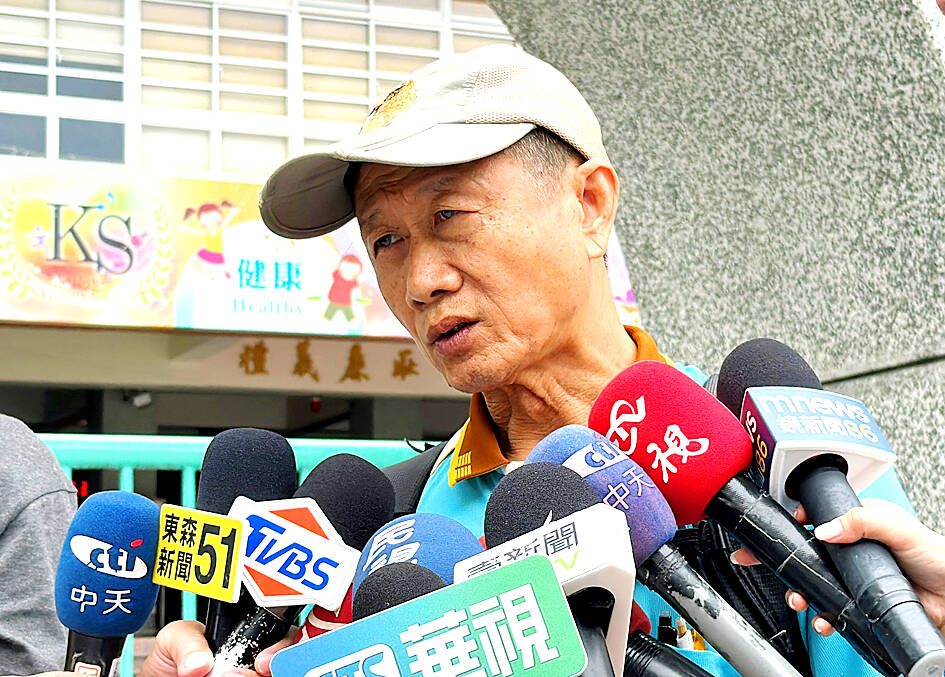The family members of several murder victims said the Constitutional Court’s constitutional interpretation of capital punishment on Friday made it the “darkest day” of their lives, adding that capital punishment would no longer deter would-be criminals.
The Constitutional Court ruled that the death sentence is “conditionally constitutional “ and should only be applied in “exceptional” cases.
Reacting to the ruling, the uncle of murdered policeman Tsao Jui-chieh (曹瑞傑), whose killer’s case can still be appealed, said that further restrictions on the applicability of the death sentence meant that it would no longer be a deterrent.

Photo: Hsu Li-chuan, Taipei Times
Tsao, 27, and Tu Ming-cheng (徐明誠), 36, were killed in the line of duty in Tainan on Aug. 22, 2022 while in pursuit of prison escapee Lin Hsin-wu (林信吾).
Lin stabbed Tu 17 times and Tsao 38 times and also took a handgun from Tu’s holster and fired six shots at Tsao’s police cruiser. Both officers died at a local hospital.
Tu’s sister yesterday expressed her disagreement with the concept of “re-education” and said the constitutional interpretation is forcing the public to give killers a second chance, which she said “is both puzzling and disappointing.”
Meanwhile, based on the constitutional interpretation on Friday, Lin Yu-ju (林于如), the only female convict on death row, might also be exempt from the death penalty, as during her trial her lawyer argued that she had intellectual disabilities.
The Constitutional Interpretation on Friday stipulates that imposing the death penalty is “prohibited” for “defendants with mental conditions, even if their mental conditions was not a factor in their offense in the cases in question.”
The surviving kin of Lin Yu-ju’s victims said Lin Yu-ju being spared capital punishment is unacceptable.
Widower Chang Chieh-neng (張介能) said yesterday that anti-death penalty supporters have the blood of victims on their hands and had turned a blind eye to victims’ human rights while championing the “human rights” of murderers.
Chang’s wife, surnamed Chen (陳), was killed by Liu Chih-ming (劉志明) in November 2014.
Liu had a hammer on him as he was looking for his former girlfriend, who had broken up with him, near her home.
After failing to find her, he approached Chen who was returning home after shopping for groceries and struck her head with the hammer 14 times.
Initially sentenced to death, the fourth retrial stated that Liu’s actions were spontaneous and not pre-meditated, which demonstrated that he could be “re-educated,” and instead sentenced him to life imprisonment and disenfranchised for life.
Even if the death penalty is to be abolished, there should be supplementary measures such as having the convicts serve life sentences instead, he said, adding that judges who spoke about the “re-education” of death row convicts have failed to define what qualities garnered “re-education.”
Additional reporting by Chen Feng-li and Hsu Li-chuan

China might accelerate its strategic actions toward Taiwan, the South China Sea and across the first island chain, after the US officially entered a military conflict with Iran, as Beijing would perceive Washington as incapable of fighting a two-front war, a military expert said yesterday. The US’ ongoing conflict with Iran is not merely an act of retaliation or a “delaying tactic,” but a strategic military campaign aimed at dismantling Tehran’s nuclear capabilities and reshaping the regional order in the Middle East, said National Defense University distinguished adjunct lecturer Holmes Liao (廖宏祥), former McDonnell Douglas Aerospace representative in Taiwan. If

TO BE APPEALED: The environment ministry said coal reduction goals had to be reached within two months, which was against the principle of legitimate expectation The Taipei High Administrative Court on Thursday ruled in favor of the Taichung Environmental Protection Bureau in its administrative litigation against the Ministry of Environment for the rescission of a NT$18 million fine (US$609,570) imposed by the bureau on the Taichung Power Plant in 2019 for alleged excess coal power generation. The bureau in November 2019 revised what it said was a “slip of the pen” in the text of the operating permit granted to the plant — which is run by Taiwan Power Co (Taipower) — in October 2017. The permit originally read: “reduce coal use by 40 percent from Jan.

‘SPEY’ REACTION: Beijing said its Eastern Theater Command ‘organized troops to monitor and guard the entire process’ of a Taiwan Strait transit China sent 74 warplanes toward Taiwan between late Thursday and early yesterday, 61 of which crossed the median line in the Taiwan Strait. It was not clear why so many planes were scrambled, said the Ministry of National Defense, which tabulated the flights. The aircraft were sent in two separate tranches, the ministry said. The Ministry of Foreign Affairs on Thursday “confirmed and welcomed” a transit by the British Royal Navy’s HMS Spey, a River-class offshore patrol vessel, through the Taiwan Strait a day earlier. The ship’s transit “once again [reaffirmed the Strait’s] status as international waters,” the foreign ministry said. “Such transits by

Taiwan is doing everything it can to prevent a military conflict with China, including building up asymmetric defense capabilities and fortifying public resilience, Vice President Hsiao Bi-khim (蕭美琴) said in a recent interview. “Everything we are doing is to prevent a conflict from happening, whether it is 2027 or before that or beyond that,” Hsiao told American podcaster Shawn Ryan of the Shawn Ryan Show. She was referring to a timeline cited by several US military and intelligence officials, who said Chinese President Xi Jinping (習近平) had instructed the Chinese People’s Liberation Army to be ready to take military action against Taiwan